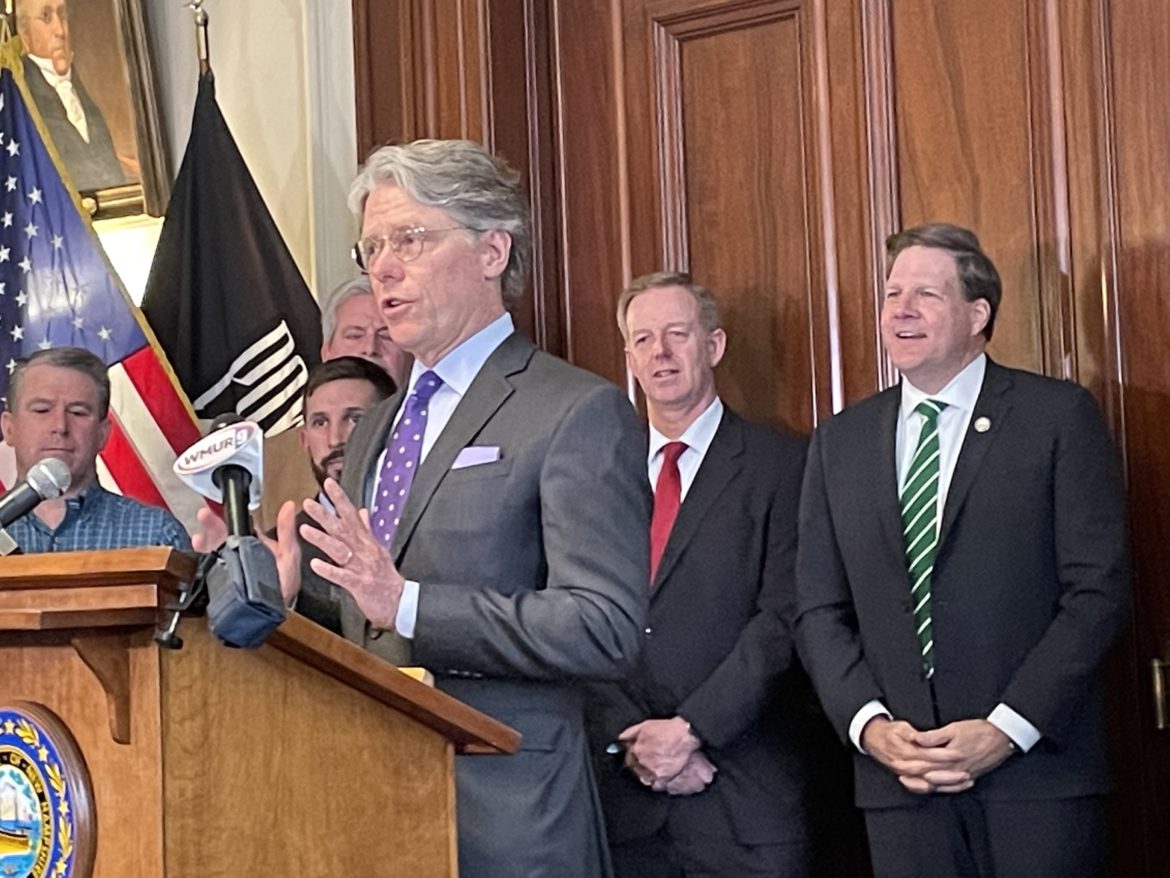By PAULA TRACY, InDepthNH.org
CONCORD – To address the state’s serious rental housing shortage, Gov. Chris Sununu and business leaders held a press conference Wednesday to promote his $100 million idea called the InvestNH Housing Incentive Fund.
As outlined in his State of the State Address this winter, the idea is to use one-time federal funds to incentivize local communities and developers to support the creation of more low to moderate housing from the rural North Country to the border with Massachusetts.
The measure will come for a vote before the Joint Legislative Fiscal Committee this Friday and does not require a contract vote by the state’s Executive Council.
It includes $40 million which would be available immediately as grants for municipalities to approve units, providing a reward of $10,000 per unit developed quickly which would allow for about 3,000 new units.
It also involves $60 million in development grants for non-profit and for-profit developers interested in creating multifamily projects of five or more units per development.
The state’s rental vacancy rate is among the lowest in the country according to NH Citizens Count, and that is impacting the state business industry’s ability to attract more workers.
The state lists the rental vacancy rate at .6 percent when a healthy rate is between 3 and 5 percent, said Taylor Caswell, commissioner of the state’s Department of Business and Economic Affairs. He notes that this is not a problem specific to the Granite State.
“Workforce continues to be our number one challenge,” Sununu said. “We need those young families.”
He said this would help make smaller developers able to access funds in the state’s 220 cities and towns.
Local control is very important, Sununu said, but rather than use a stick, he prefers this as a carrot to incentivize communities to move those projects faster.
He said this might allow the state to capture development which might go to other states.
The governor was surrounded by members of the business community including the Business and Industry Association, owners of manufacturing, retailers, and members of the state’s tourism and restaurant communities who all support the $100 million investment through the ARPA or the American Rescue Plan Act.
Caswell said this is a “once in a lifetime investment,” which can help communities, businesses, and development needs.
It includes funds for municipalities to deal with zoning challenges and to update their zoning ordinances.
The money will be offered on a first-come, first-served basis and already, he said, he is hearing from interested communities and developers.
The idea he said has made him “very popular.”
Brian Murphy of Concord, who owns a molding manufacturing business said his plan is to double his workforce in five years but with very limited housing, it will be difficult to realize that in that time frame.
The governor said these dollars are targeted for low and middle-income housing development.
The plan is to be transparent and to show where the money is going and to whom, with the chance to look at the geographic distribution.
Those who have been disproportionately disadvantaged by the pandemic, particularly those with disabilities, will also have a chance to access these funds, Caswell said.
The governor said he believes in local control and bills which would take that away from municipalities could have adverse, long-term impacts which he cannot support.
“This is a supply problem,” the governor said. He said it could also impact the cost of housing. “Let’s create competition by increasing supply.”
Senate Bill 400, which could address training and procedure for zoning and planning boards and look at barriers to development, is progressing through the legislature and just had a hearing on April 7 before the House Municipal and County Government Committee.
Under the federal rule, all the money under ARPA must be obligated by Dec. 31, 2024, and spent by the same date in 2026.
Caswell thinks that by that time, all this money will be spent.
Under the plan:
Grants for Municipalities ($40 million)
-A $30 million municipal grant program will provide cities and towns with $10,000 per unit, up to a total of $1 million per locality, and will incentivize towns to address housing shortages in their communities by offering highly flexible grants.
-$5 million planning/zoning grant program will provide resources to cities and towns to update or expand pro-housing planning and zoning regulations
-$5 million demolition grant program will assist municipalities with financial resources for the demolition of vacant or dilapidated buildings.
Grants for Owners and Developers ($60 million)
-$50 million for development grants for nonprofit and for-profit developers and owners to assist with costs in building new multifamily (5 or more units) projects.
The program will have a preference for projects that increase affordable rental units in place for lower and middle-income workers to support our health care and child care providers, machinists, teachers, and others.
Funds may be used for reimbursement of construction/hard costs only and will be the last funds in.
Applicants must demonstrate a project investment that is at least a dollar-for-dollar match to the requested State grant.
Projects will be expected to complete their project plan within InvestNH deadlines.
The application will open in June, allowing developers to take advantage of this funding in the 2022 construction season.
-The remaining $10 million will be allocated to the New Hampshire Housing Finance Authority (NHHFA) for deployment into their programming, such as the HOME Investment Partnership Programs and the Affordable Housing Fund.





